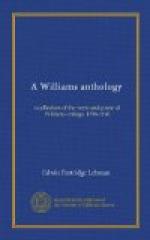Because Williams and Yale have produced great and useful men, it does not follow that their commencement dinners are always marked by the finest flow of wit and wisdom, nor that pioneers in civilization who bring great honor to their alma mater should always and everywhere speak for her. Dinner-speaking is a fine art, not one for which men need absolutely European travel and study, but one which is never mastered except by those who love and perhaps know how to reach all the beautiful thoughts of every age and clime. It is the cultured gentleman of social experience, who may or may not be a man of great ability, but who knows how to weave the poetic and humorous and commonplace into beautiful or grotesque forms, that delights and surprises a dinner company. Social experience and good abilities will not alone make the successful speaker. Underneath and back of all must be the gentleman. A lawyer, though of splendid position, can ill afford to say at the festal table of his alma mater, “Harvard takes great poets and historians to fill her vacant professorships; my college takes boys, who have proved their qualifications by getting their windows broken.” Those who go deeper than the surface will perhaps surmise that Harvard has had better material to work upon than some colleges; not perhaps material of finer abilities, but material that has been more under the influence of sweetness and light. Possibly her graduates are as superior at making dinner speeches as are her trustees in choosing professors.
A gentleman must make the happy dinner-speech, for only he can perceive the proprieties of the situation. He will neither improve the occasion to give the corporation advice as to the management of the college, nor try to point out to a company of Unitarians the superior advantages of the orthodox faith, nor exhibit to invited guests the rags of his alma mater’s poverty. He may, perhaps, avoid the commonplace by so doing, but he will certainly transgress the rules of propriety. The commonplace at a dinner, repeated every year under so nearly similar conditions, cannot be avoided, but can be transformed by the art of the master.
What could be more difficult than the duty of presiding at the dinner of the New England Society and rehearsing the threadbare story of the landing of the Pilgrims and dilating upon it in such a way as to entertain New Englanders, who ever since their childhood have heard the declamations of Webster, Everett, Winthrop, and the rest, about that heroic band? Yet by a mixture of shrewd wit and eloquence Mr. Choate, a Harvard graduate, went over again, last year, at the sixty-fourth anniversary of the society, the main facts of the history, and dwelt upon the relations of New Englanders to New York, making a speech that, printed, fills ten octavo pages but which the audience found charming from beginning to end.




